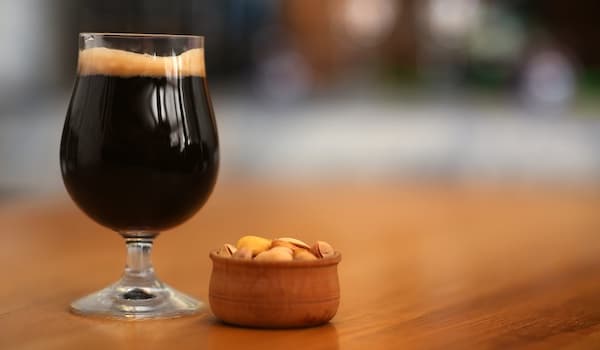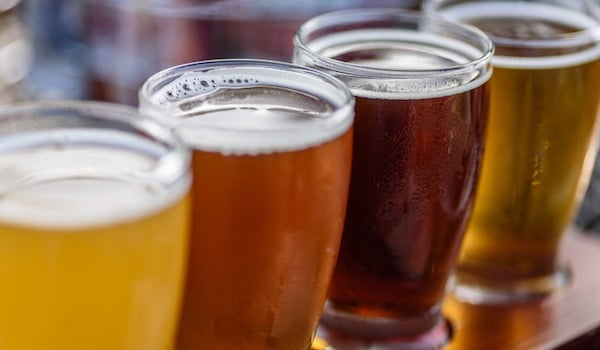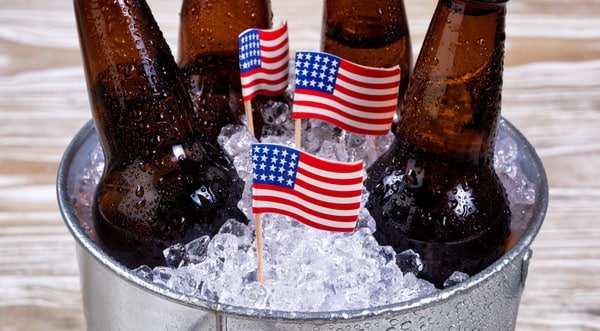
This article may contain affiliate links. If you click them, we may earn a small commission at no extra cost to you.
In This Article
Introduction to Porter Ales
Of the many dark beer styles, Imperial Stouts get the most hype, and brands like Guinness dominate the market, but the true beer aficionados prefer a simple and well-made porter. This malt-forward dark ale is the original dark beer, offering drinkers a more balanced flavor profile and surprising drinkability.
It’s the ideal beer for autumn and winter as its roasty flavors have a warming effect, but porters aren’t quite so decadent that they’re out of the question on a warm day. Even better, the nuanced flavors are less likely to overpower dishes when paired. There’s a surprising variety of porter styles worth trying, with a few major brands you can find almost anywhere.
And while some classic examples are easy to track down, many modern porters and dark ales — especially seasonal or specialty releases — can be harder to spot. If you’re looking for an easy way to explore different porter styles without committing to a full six-pack blind, services like BeerDrop make it simple to discover curated selections from independent breweries.
Here’s everything you need to know about porters:
A Brief History of Porter Beer
Originating in London in the 18th century, the beer was popular among dockworkers, who were colloquially known as “porters” at the time. The recipes originated in tweaking and blending brown ales to be darker. As you can imagine, this hearty ale made sense for the maritime working class, a nice porter warming you up after a long day on the breezy and sometimes frigid docks. As London industrialized, porter became the first beer style to be mass-produced, becoming the most commonly drunk beer in the UK for decades.
The popularity among British dockworkers and sailors eventually spread east, and Baltic porters were developed in other port cities. In the craft beer boom of the late 90s and 2000s, porter has seen a resurgence in the US and Europe, with new experimentation happening with specialty releases.
What Does Porter Beer Taste Like?
Common Flavor Characteristics
Porters offer rich chocolate, caramel, and coffee notes without the cloying sweetness of other dark beer styles like stout. There’s a balanced bitterness and a subtle (but aromatic) hop bite common in American porters from craft breweries. Traditionally, a dry finish works with the bitterness from the malts. Some sweetness should be expected, but much less than a stout.
Aroma and Mouthfeel
While porters may look hefty, they have a medium body with a slightly creamy mouthfeel that’s easy to drink. The roasty and slightly nutty aromas will largely mirror the taste of a porter. The coffee or caramel aromas are highly desirable, which is why so many modern porters will have adjunct ingredients added on.
Different Styles of Porter
There are a few substyles of porter that are either traditional or inventions of craft brewers.
English Porter
- The original, all porters are based on these English ales.
- The flavor profile will be mildly bitter from the roasted malts.
- Most British ales have lower ABV, and the porter is no different!
- There will be very little sweetness as this type of porter finishes bone dry.
American Porter
- Hoppier than other types of porter, don’t be surprised to find piney West Coast hops and more bitterness.
- You can expect bolder flavors and higher alcohol in many American-style porters.
- US brewers commonly include adjuncts like vanilla and coffee to really bring the flavor.
- Expect a slightly boozier porter than English versions.
Baltic Porter
- These can be brewed with lager yeast and cold fermentation, making their category harder to define.
- These will have a higher ABV than English-style porters.
- Expect a smoother finish, often with chocolate-forward notes and some bitterness.
Specialty Porters
Modern porters, especially those from American craft brewers, offer nearly unlimited possibilities for flavors.
- Dessert porters, similar to pastry stouts, will have all sweet adjuncts added.
- Similar to German Rauchbier, smoked porters will have kiln-dried (or “smoked”) malts that leave.
- Barrel-aged porters will sit in used spirits barrels for months or years. Bourbon barrels are by far the most popular, but Scotch and rye whiskey barrels are also common.
Porter vs Stout – What’s the Difference?
Porter actually gave birth to the stout style of beer, as stronger versions (or “stout porter”) were developed over time. Stout eventually became its own style, and is now exponentially more popular than porter. The two have many similarities and are slightly interchangeable, but there are general distinctions to look out for.
| Feature | Porter | Stout |
| Origin | 18th-century London | Offshoot of porter |
| Body | Medium | Medium to full |
| Flavor | Roasty, chocolate, mild | Strong roast, coffee, bitter |
| Alcohol Content | 4–7% | 5–12%+ (especially imperial) |
| Yeast | Ale yeast | Ale yeast |
Where to Find Great Porters and Dark Ales
Despite their long history, porters don’t enjoy the same shelf space as IPAs or lagers. Many breweries release them seasonally, and some of the best examples — especially Baltic porters, smoked porters, and barrel-aged versions — may only appear briefly before disappearing again.
One way to get around that is by using a beer discovery service like BeerDrop. They work with independent craft breweries across the U.S. and regularly feature porters, stouts, and other dark ales that don’t always make wide distribution. It’s a practical way to explore different interpretations of the style without relying solely on what your local shop happens to carry.
Why BeerDrop works well for porter lovers:
- Rotating selections from independent craft breweries
- Access to seasonal and limited dark beer releases
- Ability to browse by style
- Flexible options for different budgets and commitment levels
👉 Explore porter and dark ale selections on BeerDrop
Popular Porter Beers to Try
It’s important to note that while porter is easy to find on beer shelves and draft lists, there aren’t as many national brands as there are for lager or IPA. You’ll still find excellent examples of the style from major breweries in most markets, but you should absolutely check out your local brewery’s porter. Here are a few of the best easy-to-find porters:
- Bell’s Porter: (5.6% ABV) – This porter has racked up plenty of accolades over the years, making it one of the most renowned versions of the style. Expect a very robust mouthfeel with substantial chocolate and coffee notes and a subtle hop bitterness.
- Alaskan Brewing Co. Baltic Porter: (9.8% ABV) – The brewery’s smoked porter is equally worthy of a shoutout, but Alaskan Brewing’s Baltic Porter is by far the best example of the style you can get in the US market. Deep malt-forward bitterness plays well with cocoa, coffee, and even vanilla flavors. Dried fruit, cherry aromas, and a dry finish cap off what can only be described as the perfect campfire beer.
- Breckenridge Vanilla Porter: (5.4% ABV) – Of all the “dessert porters” that you can get practically anywhere, this is the one to try. With vanilla beans sourced from Papua New Guinea and Madagascar, this Colorado brewery perfectly balances the unmistakable vanilla aromas with the roasty and chocolatey base.
- Deschutes Black Butte Porter: (5.5% ABV) – One of the best examples of an American porter, expect wonderful balance between the piney Cascade hops and the roasty malts. It drinks smoothly, but packs complex flavors into every sip. Even better, you can find it almost anywhere.
- Samuel Smith’s Taddy Porter: (5% ABV) – This classic English porter’s recipe has been perfected for decades and uses well water from the centuries-old brewery along with local malted barley and English hops. It’s slightly sweet with chocolate and licorice notes, but the lovely coffee aromas steal the show.
How to Serve and Pair Porter Beers
Ideal Serving Temperature & Glassware
- 45–55°F (7–13°C) is ideal, and letting a porter warm will open up new flavors and aromas.
- Porters are best in a nonic pint or tulip glass, as these will trap the chocolatey aromas.
Food Pairings
- BBQ meats, especially smoked brisket or ribs, will stand up to the bitterness and bolder flavors of a porter.
- Roasted vegetables with some char pair perfectly with the toasted flavors.
- Chocolate cake or brownies are perfect with the coffee and caramel flavors of a porter
- Blue cheese or smoked cheddar, especially with some darker bread/crackers and dried fruit.
Conclusion: Should You Try a Porter?
Just because porters don’t fly off the shelves like pastry stouts or barrel-aged stouts doesn’t mean they’re not worth drinking. This underrated beer style has its fans, who tend to be die-hard beer drinkers and brewers themselves. There’s simply no good reason not to take a chance on a porter! It’s bound to be your new favorite winter warmer or even go-to beer for watching the game.
If you enjoy darker beers but want something balanced, versatile, and deeply satisfying, porters deserve a regular spot in your rotation. And if you want a convenient way to keep discovering new porters and other dark ales throughout the year, a customizable subscription from BeerDrop makes exploration easy — especially when these beers are only around for a short time.





